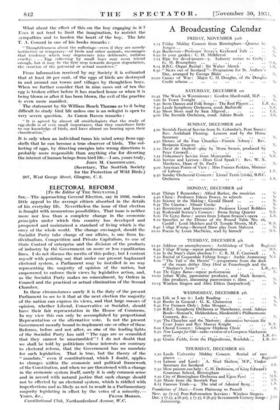• ELECTORAL REFORM
[To the Editor .of THE SPECTATOR.] SIR,-The approaching General Election, say in 1936, makes little appeal to the average citizen absorbed in the details Of his everyday life. Nevertheleas the issue of that election is fraught with momentous possibilities. That issue is neither more nor less than a complete change in the economic principles under which this country has developed and prospered and maintained a standard of. living which is the envy of the whole world. The change envisaged, should the Socialist Party take charge of our affairs, is one from In- dividualism, Competition and Private Capitalism, to one of State Control of enterprise and the division of• the products of industry by the. Government on more or less equalitarian. lines. I do not discuss the merits of this policy, but I content myself with pointing out that under our present haphazard electoral system, a Parliament may be installed in no way representing the majority of opinion of the nation, but empowered to enforce their views by legislative action, and,: as the Socialist Party makes no concealment, by Orders in Council and the practical or actual elimination of the Second Chamber.
In these circumstances surely it is the duty of the present Parliament to see to it that at the next election the majority: of the nation can express its views, and that large masses of
opinion, whether Liberal, COnservative or Socialist, should have their fair representation in the House of Commons.. In my view this can only be accomplished by proportional. Representation or the alternative vote. Is not the present Government morally bound to implement one or other of these, Reforms, before and not after, as one of the leading lights. of the Socialist Party has said " The eggs are so scrambled that they cannot be unscrambled " ? I do not doubt that we shall be told by politicians whose interests are 'contrary to electoral reform, that the Government has no mandate for such legislation. That is true, but the theory of the " mandate," even if constitutional, which I doubt, applies to changes within the economic and political framework of the Constitution, and when we are threatened with a change in the economic system itself, surely it is only common sense and in accord with natural justice that such change should not be effected by an electoral system, which is riddled with imperfections and as likely as not to result in a Parliamentary majority legislating in effect by the votes of a minority.-










































 Previous page
Previous page